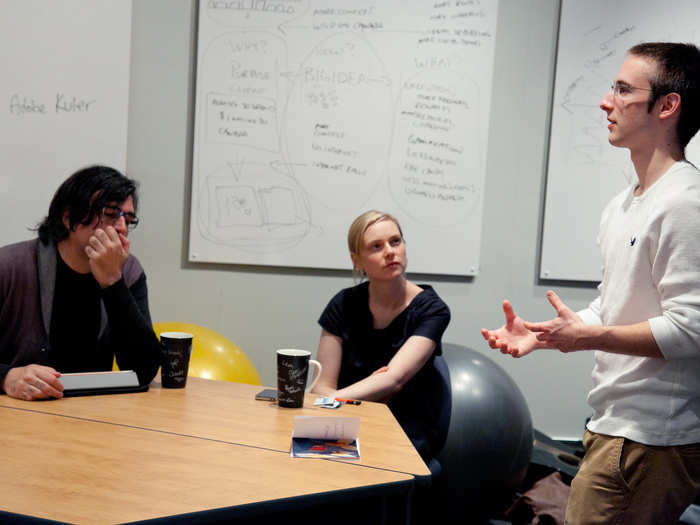- Home
- slideshows
- miscellaneous
- A former dominatrix started a school to teach women how to wield power - here are her biggest tips
A former dominatrix started a school to teach women how to wield power - here are her biggest tips
Urbaniak says people are finally starting to get comfortable with an idea that she has been proselytizing for years: leaving important things unsaid doesn't help men or women.

At her school, she coaches women in understanding how to ask for things "in a way that men don't have to think about," as she put it.

She said it's unfortunate, but often women have to learn to "bypass a lot of conditions that set off weird vibes," in situations like asking for a raise or extra time off. Often, these kinds of interactions can skew power dynamics in relationships between men and women, and leave the men coming out on top. But Urbaniak isn't OK with that.
"I'm not waiting until the entire world changes," she said. "We just like to arm women with what to do about it."
Urbaniak said one of the best ways to combat speechlessness is by taking a more dominant stance in conversations.

That means focusing attention outside of yourself, and talking about something that doesn't include you as the subject.
For example, in a job interview, this might mean talking about your own experiences less, and focusing more on the new company, and what actions need to be taken there.
How we talk to each other is only part of the equation. Dominatrixes like Urbaniak know that the other cardinal ingredient for effective communication is focused attention.

Urbaniak says there's a power balance at play in just about every social interaction between the person who's giving attention and the person who's receiving attention.
One person is usually submissive, and the other is dominant. That's not to say being "sub" is worse than being "dom," they simply serve different roles in a relationship.
Being submissive can often show up in self-reflective language, which puts more attention on yourself and focuses the conversation on you. A more dominant stance tends to demonstrate agency, putting the attention outwards and on to another person, question, or business idea.
When we demonstrate a dominant state of attention, we focus our attention outwards, instead of on ourselves.

"If I'm talking about myself from my own experience, I'm pulling you into my experience, I'm the subject," Urbaniak said. "I'm, in a way, like the submissive of a dominatrix session."
She argues that paying attention to how another person's feeling and operating is the "primary ingredient for great connection and leadership."
In a threatening or uncomfortable situation, turning attention away from yourself when someone's being creepy can help break a paralyzing freeze.

One of Urbaniak's favorite ways to do this is by answering a threatening or uncomfortable question with a question of your own. Again, the goal here is to turn attention away from yourself, which means the questions won't be about you.
Say someone asks a question like "Did being a woman help you get this job?" You could answer with another question, like "Do you like asking provocative questions?"
The idea is that whatever you say, you take the focus off you, and step out of what can be a kind of temporarily paralysis. And Urbaniak says it really works.
"After you deliver even two lines about something outside yourself, the freeze is broken," she said.
If someone is being ambiguous or unclear, bring that up.

In Urbaniak's verbal self-defense course, she suggests countering ambiguous or disingenuous language with an upfront approach. One of her favored ways to counteract someone who's being unclear is with the phrase "it seems like..."
She gives her students this example of how to counter a veiled proposition, like if someone says "I just want to get to know you better."
She suggests countering that kind of veiled ambiguity by being ultra-clear:
"It seems like you are no longer interested in talking about business, and it seems like getting to know each other better may mean something different to me than it does to you. Is that true?"
There's no simple, one-size-fits-all recipe for effective communication.

Mastering the art of paying attention to the people you work and live with isn't going to look the same in every situation, because different people react differently to giving and receiving attention.
But the idea is to get curious about the situation you're in. Often, that means asking more questions.
Even if you don't get the answer you're hoping for, you'll find out more about what a person cares about, or where their priorities lie. That information can help everyone get more of what they need in the future.
Learning how to pay better attention to others can help us understand their needs. But it's not a magic formula. People won't know exactly what you need if you don't tell them.

Urbaniak says historically, many of women's needs, desires and ideas have remained hidden and unspoken, so that people could feel "less troublesome and more approved of," but she argues that paradigm is one in need of a big shift.
"We're going to have to be really brave right now, and ask for things that we were never willing to ask for before," she said.
Being "low maintenance" doesn't actually help anyone.

When we don't ask for what we need in relationships, other people can't help us. Urbaniak said that kind of "hidden" self-sacrifice ends up turning into resentment, because it doesn't get rewarded or taken care of.
"It does not get rewarded because, actually, its not helping anyone," she said.
Urbaniak said speechlessness can be a tough habit to break, because women have been socialized for eons to consider the needs of the many over the individual.

"We really have to consider the fact up until not very long ago the best thing a woman could do for herself and her status and her future was to marry well," she said.
"If for millennia your greatest possibility is to marry well, then what are you going to learn?"
She argues this means women tend master social dynamics in ways that men don't always.

For better or worse, Ubraniak says women have historically learned "how to meet the needs of the whole," developing a solid understanding of how groups work and mastering key social skills.
It means women might not be as comfortable asserting their own needs, but can also have the potential to be an incredible leadership skill.
Because it means that women in leadership "tend to see the whole" of their organization.

Urbaniak calls this quality "responsive behavior" and says that in the right context, this kind of understanding and gauging the needs of others before they've even voiced them can be a great asset.
But it can also put women at a disadvantage if they're always responding to the needs of others and not their own.
The truth is, we need more responsive behavior from everyone these days.

If the world's hierarchies and old social and business structures are to become flatter, understanding the needs of the whole will become even more important.
"What we're calling patriarchy? It sucks for everyone," Urbaniak said.
"What we're calling 'feminine' is required for everybody," she said.

Popular Right Now
Popular Keywords
Advertisement